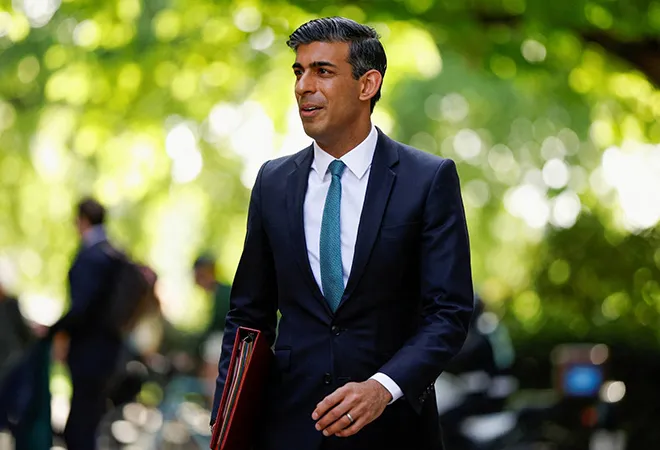Promising economic stability and political unity, Rishi Sunak assumed office as the new Prime Minister (PM) of the United Kingdom (UK). He has made all the right noises so far. In his first public speech, Sunak spoke of a “profound economic crisis” with Covid-19 and the war in Ukraine contributing to the situation.
He also admitted that “some mistakes were made” by his predecessor and warned that there were “difficult decisions to come.” In Parliament, he seemed to pep things up for the Tories as he took on the Labour Party and gave a renewed sense of purpose to party backbenchers, despondent under Liz Truss.
Financial markets were roiled in recent weeks as poor decision-making weakened the fundamentals of the economy with the British pound plunging to a record low against the dollar and government borrowing costs rising sharply in the aftermath of Truss’s mini-budget.
With his cabinet formation, Sunak tried to provide a sense of stability by bringing various factions together. He continued with three key cabinet positions from the Truss administration — Jeremy Hunt as chancellor, James Cleverly as foreign secretary and Ben Wallace as defence secretary — ensuring much-needed continuity in policymaking.
Hunt had reversed most key economic policies of Truss and he is in sync with Sunak on how best to tackle the challenges facing the British economy. Financial markets were roiled in recent weeks as poor decision-making weakened the fundamentals of the economy with the British pound plunging to a record low against the dollar and government borrowing costs rising sharply in the aftermath of Truss’s mini-budget. Sunak had warned about this during the leadership contest and when Truss promised major tax cuts without making adequate provisions for their financing, the markets went into a tailspin.
Sunak’s entry stabilised the situation but the political and economic uncertainty of the past few months has damaged British credibility hugely. Sunak’s first priority will be to restore the trust in the ability of the British government to manage a delicate situation, both politically and economically. The underlying political instability is, in more ways than one, a consequence of the Brexit referendum. The Conservative Party has been struggling to come to terms with it and is yet to find a way out. Sunak will hope that by managing the economy effectively, he will be able to give a new sense of purpose to the Tories, who are struggling politically against a resurgent Labour.
Sunak’s first priority will be to restore the trust in the ability of the British government to manage a delicate situation, both politically and economically.
Yet, this is easier said than done. His economic policies are not going to make him popular with the Tory base and that’s one of the reasons why Truss had won the leadership contest. To balance this out, he seems to have reached out to Suella Braverman, who was reappointed as home secretary just six days after she resigned over a security breach. Braverman represents the Right-wing of the party and her support was key to Sunak’s appointment. Her tough stance on immigration will give some political space to Sunak to take unpopular economic decisions. This will also be important to shore up support among traditional Tory voters who may not find Sunak’s other policies very appealing.
There has been some debate on Braverman’s re-appointment. The challenge is not only domestic, but also external. She publicly expressed concerns about having an open borders migration policy with India and her targeting of Indian migrants as “the largest group of people who overstay” may have more to do with domestic politics, but it has vitiated the political climate around India-UK bilateral ties. Sunak’s task will be even harder now as he seeks the conclusion of the much vaunted India-UK free trade agreement (FTA). Calling India an “economic superpower” and arguing that an FTA would improve access to its “dynamic market,” Greg Hands, the minister for trade policy, suggested that the “majority of chapters” of the FTA were already reached, with more rounds expected shortly. But as someone of Indian descent, Sunak is likely to face even greater scrutiny as his government moves forward with this initiative.
Sunak’s task will be even harder now as he seeks the conclusion of the much vaunted India-UK free trade agreement (FTA).
There is some unnecessary hype in India surrounding Sunak’s rise. His rise to the British prime ministership marks a significant moment in British politics. But he will govern, as he should, keeping British interests in mind, and his lineage will hardly have any role to play in the process. There are multiple challenges he faces and Indians should be realistic in their assessment of what he might mean for India-UK ties. The bilateral relationship is growing due to a newfound convergence in their strategic orientation. Let’s not burden Sunak with unrealistic expectations.
This commentary originally appeared in Hindustan Times.
The views expressed above belong to the author(s). ORF research and analyses now available on Telegram! Click here to access our curated content — blogs, longforms and interviews.




 PREV
PREV


